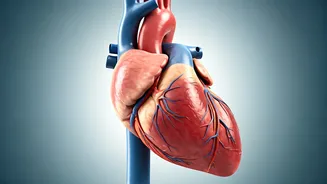Embrace Regular Exercise
The first tip centers around the importance of consistent physical activity. It encourages incorporating exercise into your daily routine. This doesn't
necessarily mean hitting the gym for hours each day; even moderate exercise, such as brisk walking, cycling, or swimming, can have significant benefits. The article highlights that regular physical activity helps maintain a healthy weight, strengthens the cardiovascular system, and reduces the risk of various chronic diseases. The cardiologist recommends finding activities you enjoy, making them easier to stick with over time. The key is consistency, aiming for at least 30 minutes of moderate exercise most days of the week to maximize the advantages for your health. This simple shift can lead to notable improvements in your overall well-being and life span.
Nourish Your Body Wisely
Next, the advice emphasizes the significance of a balanced diet. The recommendation is to focus on a diet rich in fruits, vegetables, whole grains, and lean proteins, while minimizing processed foods, sugary drinks, and excessive fats. The article likely suggests strategies such as meal prepping, mindful eating, and understanding portion sizes. Eating a nutritious diet provides your body with the essential vitamins, minerals, and antioxidants needed for optimal function and disease prevention. The cardiologist's insights may include specific examples of heart-healthy foods, such as those high in omega-3 fatty acids, or those that have been proven to reduce inflammation, contributing greatly to overall wellness. The shift to a healthier dietary pattern greatly impacts overall health.
Prioritize Quality Sleep
Adequate sleep is another critical component in the cardiologist's list. Getting enough sleep is crucial for physical and mental restoration. The article probably recommends aiming for 7-9 hours of sleep each night for adults. Insufficient sleep can lead to various health problems, including weakened immunity, increased risk of cardiovascular disease, and impaired cognitive function. Suggestions may include establishing a regular sleep schedule, creating a relaxing bedtime routine, and optimizing the sleep environment. The expert might have underlined the detrimental effects of sleep deprivation, emphasizing the positive impact of quality sleep on your body. Focusing on a regular sleep schedule aids in the body's natural processes of repair and rejuvenation, thereby improving your long-term health.
Manage Stress Effectively
The cardiologist's tips also include effective stress management. Chronic stress can wreak havoc on your health, contributing to high blood pressure, weakened immunity, and even mental health issues like anxiety and depression. The article might recommend various stress-reduction techniques, like meditation, yoga, deep breathing exercises, and spending time in nature. It could also suggest identifying and addressing the sources of stress in your life, whether through lifestyle changes or seeking professional help. The article likely stresses the importance of regularly engaging in stress-relieving activities to safeguard your physical and mental health. Successfully managing stress can improve your overall quality of life and decrease the risk of serious health conditions.
Maintain Healthy Weight
Maintaining a healthy weight is another key area the article likely explores. Being overweight or obese increases the risk of numerous health problems, including heart disease, diabetes, and certain types of cancer. The cardiologist probably suggests a combination of a balanced diet and regular exercise to achieve and maintain a healthy weight. The article may highlight the importance of setting realistic goals and seeking professional guidance if needed. It could delve into how losing even a small amount of weight can have a positive impact on your health. By effectively managing your weight, you lower the risk of chronic illnesses and can significantly enhance your longevity and overall health, promoting a higher quality of life.
Limit Alcohol Consumption
The expert likely advises moderation when it comes to alcohol intake. Excessive alcohol consumption is linked to various health problems, including liver disease, heart disease, and some types of cancer. The article could specify the recommended limits for alcohol consumption, typically defined as no more than one drink per day for women and up to two drinks per day for men. It might advise abstaining from alcohol altogether for those with certain health conditions or a history of alcohol abuse. The message is to enjoy alcohol in moderation or, better yet, not at all, to protect your physical health. Reducing or eliminating alcohol consumption significantly decreases the risk of alcohol-related health issues, promoting a longer, healthier life.
Quit Smoking Immediately
Unsurprisingly, the tips strongly recommend quitting smoking if you currently smoke. Smoking is one of the most detrimental lifestyle choices, significantly increasing the risk of heart disease, lung cancer, and other severe health problems. The article will probably emphasize the importance of quitting smoking immediately to reverse the damage caused by tobacco and increase your life expectancy. The article could detail the various resources available to help smokers quit, like nicotine replacement therapy, counseling, and support groups. It's likely that it stresses that quitting smoking is one of the single most impactful things you can do to improve your health. The advice reinforces the profound advantages of quitting smoking for immediate and long-term well-being.
Regular Health Checkups
Regular health checkups are another crucial tip provided. The article will likely underscore the importance of routine visits to the doctor for checkups and screenings. Early detection of potential health problems is key for effective treatment and better outcomes. The cardiologist might recommend the frequency of checkups based on age, medical history, and risk factors. The article will stress the significance of getting regular screenings, such as blood pressure checks, cholesterol tests, and cancer screenings, to ensure early detection of serious illnesses. Regular checkups ensure you stay proactive about your health, greatly reducing the risk of complications and promoting longevity. Following these recommendations helps maintain a state of wellness.
Cultivate Social Connections
The article likely highlights the significance of social interaction. Studies show that people with strong social connections and support networks tend to live longer and healthier lives. The cardiologist may advise on the importance of maintaining relationships with friends and family, staying involved in social activities, and joining clubs or groups. Social isolation has negative health effects, so the article could advocate for actively nurturing relationships and seeking out opportunities for social interaction. Cultivating strong social connections can reduce stress, promote mental well-being, and contribute to a longer, more fulfilling life. The emphasis on community underscores the interconnectedness of physical and mental health.
Learn New Skills Continuously
The final tip likely encourages continued mental engagement, such as learning new skills throughout life. Keeping your mind active can help protect against cognitive decline and promote overall brain health. The article may suggest activities like reading, learning new languages, doing puzzles, or taking classes. The cardiologist might emphasize the importance of challenging yourself mentally and keeping your brain active to maintain cognitive function as you age. Continuously learning new things keeps your mind sharp, promotes mental agility, and can even contribute to a longer lifespan. This tip stresses the need to engage with your environment and stay curious for sustained brain health.












